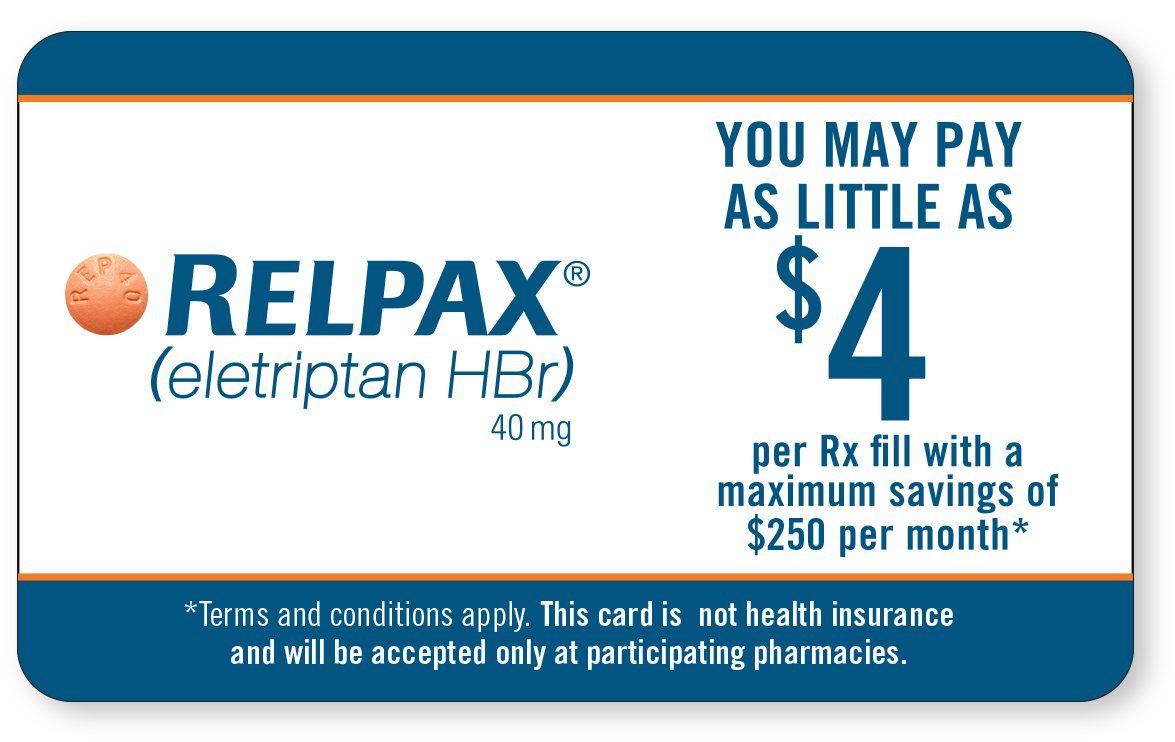Do not take RELPAX (eletriptan HBr) if you:
- Have heart disease or a history of heart disease
- Have a history of stroke, transient ischemic attack
- Have a history or current evidence of hemiplegic or basilar migraines (if you are not sure about this, ask your doctor)
- Have peripheral vascular disease (eg, narrowing of blood vessels to the legs, arms, stomach, intestines, or kidneys)
- Have ischemic bowel disease (inadequate blood supply to the intestine)
- Have uncontrolled blood pressure
- Have taken other migraine medications in the last 24 hours, including other triptans, ergots, or ergot-type medications
- Are allergic to RELPAX or any of its ingredients
- RELPAX should not be used within at least 72 hours of treatment with the following medicines: Nizoral® (ketoconazole), Sporanox® (itraconazole), Serzone® (nefazodone), TAO® (troleandomycin), Biaxin® (clarithromycin), Norvir® (ritonavir), and Viracept® (nelfinavir).
Patients taking RELPAX may experience serious side effects, including:
Heart attacks and other heart problems. Heart problems may lead to death. Stop taking RELPAX and get emergency medical help right away if you have any symptoms of heart attack like discomfort in the center of your chest that lasts for more than a few minutes, or that goes away and comes back; chest pain or chest discomfort that feels like an uncomfortable heavy pressure; squeezing, fullness, or pain; pain or discomfort in your arms, back, neck, jaw, or stomach; shortness of breath with or without chest discomfort; breaking out in a cold sweat; nausea or vomiting; feeling lightheaded.
Medication overuse headaches. Some patients who take too many RELPAX may have worse headaches. If your headaches get worse, your doctor may decide to stop your treatment with RELPAX.
Serotonin syndrome is a serious and life-threatening problem that can happen when taking RELPAX, especially when used with certain medications commonly used to treat depression, such as selective serotonin reuptake inhibitors (SSRIs) and serotonin and norepinephrine reuptake inhibitors (SNRIs). Tell your doctor right away if you experience mental changes such as hallucinations, fast heartbeat, high body temperature, trouble walking, nausea, vomiting or diarrhea.
Changes in color or sensation in your fingers and toes (Raynaud’s syndrome).
Stomach and intestinal problems like sudden or severe stomach pain, stomach pain after meals, weight loss, nausea or vomiting, constipation or diarrhea, bloody diarrhea, fever.
Problems with blood circulation to your legs and feet (cramping and pain in your legs or hips); like feeling of heaviness or tightness in your leg muscles, burning or aching in your feet or toes while resting, numbness, tingling, or weakness in your legs, cold feeling or color changes in 1 or both legs or feet.
Most common side effects are dizziness, nausea, weakness, tiredness, and drowsiness. If you have these symptoms, do not drive a car or do anything where you need to be alert. Tell your doctor about any side effects you have.
Before you take RELPAX, tell your doctor if you:
- Are pregnant or plan to become pregnant. It is not known if RELPAX will harm your unborn baby
- Are breastfeeding or plan to breastfeed. RELPAX passes into your breast milk and may harm your baby. Talk to your doctor about the best way to feed your baby if you take RELPAX
All brands are trademarks of their owners.
INDICATION
RELPAX® (eletriptan HBr) is indicated for the acute treatment of migraine with or without aura in adults. RELPAX should only be used where a clear diagnosis of migraine has been established. RELPAX is not for the prevention of migraines or other types of headaches, including cluster headache.
Please see Full Prescribing Information and Patient Information.




